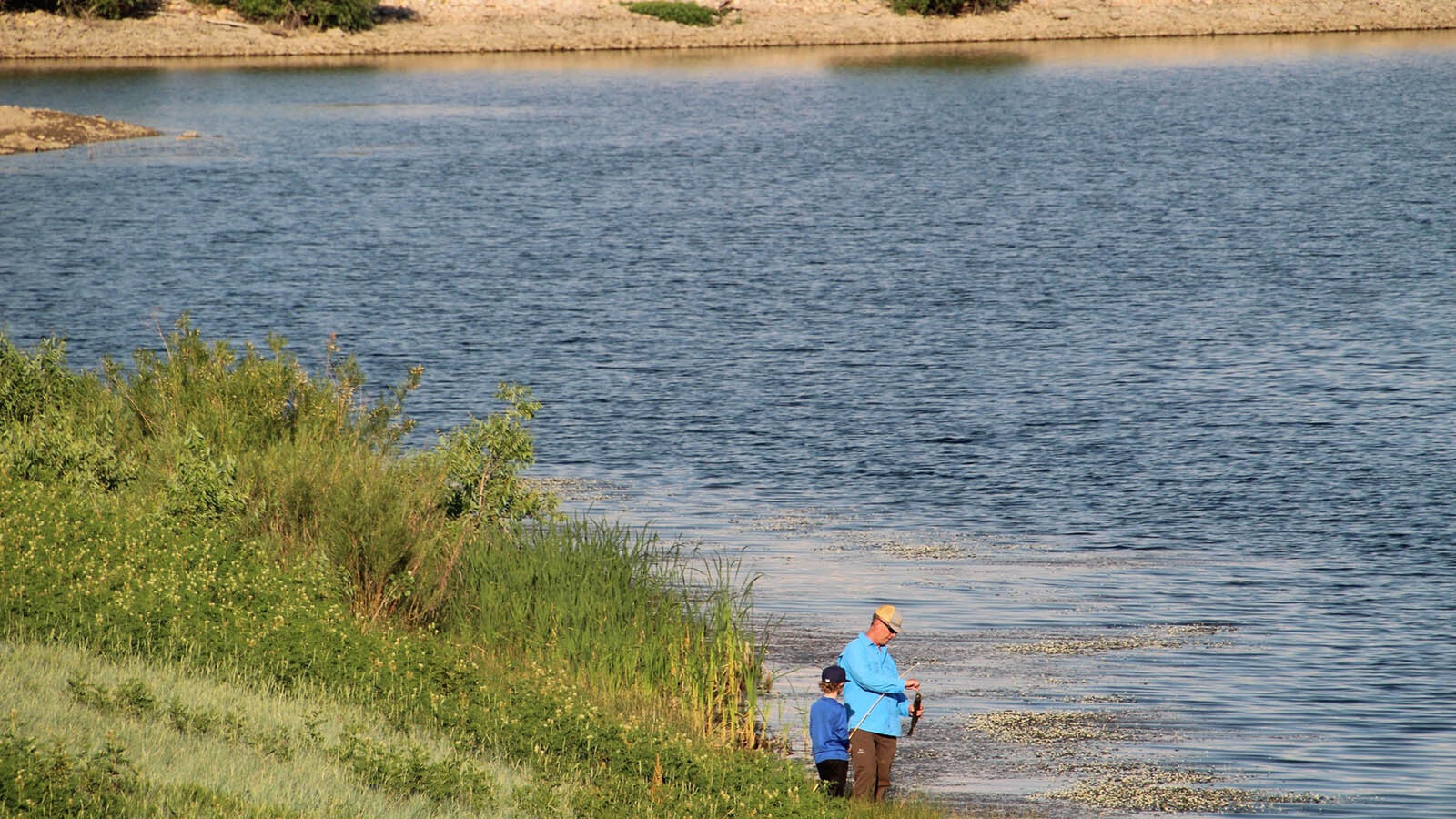Not only are opponents of a controversial land exchange in Sheridan County between the state and a private land owner concerned about what it would do to public land access now, but also in the future.
The owner of the Columbus Peak Ranch wants to trade about 630 acres of the ranch along with some cash to the state for 560 acres of state trust land at the base of the Bighorn Mountains about 10 miles away.
State Rep. Cyrus Western, R-Big Horn, and Dayton resident Mike Barrett believe there’s a real chance that if a land exchange between the state and private ranch owner Ross Matthews is approved, the state may eventually sell its newly acquired land outside of Dayton back to a private buyer for home development.
Even Jason Crowder, deputy director of the Office of State Lands and Investments (OSLI), acknowledged this could happen someday, but that there are no plans in the near future to pursue that.
“The possibility of residential, of commercial, of industrial, of nothing — are all out there,” he said. “It’s the same for every other parcel of state land that would have the same amenities adjacent to them.”
It Could Happen
In a detailed analysis OSLI performed on the land transfer in 2021, it mentions multiple times the potential that Matthews’ Columbus Peak Ranch would have for “future potential development” and “enhanced revenue generation capabilities,” which Crowder confirmed could include home development.
“That is present and could be a use into the future, but there’s nothing being shown to us right now that shows any time in the immediate future that’s a possibility,” he said.
Western said the state should not be involved in any kind of residential real estate development.
“I am not comfortable with that,” he said.
In a recent appraisal, the Columbus Peak Ranch land was valued at $2.6 million, while the state land was appraised at $3.3 million. If the exchange were approved, the $721,000 difference would be squared up with a payment from Matthews, who also made a commitment to offer up to $840,000. The equalization total grew by more than $300,000 from the appraisal of 2020 that was performed by the same company.
At a State Board of Land Commissioners meeting last week, the board voted to get a new appraisal on the properties after concerns were raised they were undervalued.
Another Kelly Parcel Situation?
Another state land issue that has drawn significant attention in Wyoming of late is the potential to put 640 acres of trust land bordering Grand Teton National Park in Teton County known as the Kelly Parcel up for a public auction.
Many Wyoming residents have said they want this land to stay public. At auction, it could be sold to a private buyer who could use the property to build luxury homes.
Barrett said he sees some real similarities between the Kelly Parcel and the Sheridan County land swap.
“It’s certainly similar because we don’t want to lose any land in the state that is beneficial to wildlife,” he said. “If that becomes home sites, all those critters have got to move.”
Crowder said if the state were to resell its newly acquired land, he doesn’t believe that would happen until 25-75 years down the road, and only if there was a market demand for it.
“Which would return a positive benefit to the beneficiaries,” he said.
Western and Barrett do not believe this time projection.
Barrett said he could see the land being resold as soon as one year after the initial exchange. He also mentioned how even if split into 80-acre parcels, seven homes could be built on what is now the private land.
Sheridan County and the Dayton area have played home to a substantial amount of residential growth in recent years.
“That it would take 25 years for somebody to buy that is, in my opinion, nuts,” Barrett said. “It is certainly within the realm of possibility fairly quickly.”
What Could Happen
Western wants the board to consider that once the state land is sold off, there will be no opportunity to get it back. He and Barrett believe there should never be a net-negative result of public land lost.
“That’s why there’s been all this pushback because sportsmen know the value of that land and the quality of the game that’s on there and we don’t want to lose it,” Western said.
Matthews, the former chairman and chief executive officer of Sinclair Oil, has contested arguments that the state lands are home to high-quality hunting, as many people opposing the exchange have claimed. He also mentioned at last week’s meeting that the state land has been overgrazed, which has resulted in a large presence of noxious weeds.
Matthews married into the famous Holding family, which owns the 190,000-acre Sunlight Ranch in Park County and southern Montana, just outside of Yellowstone National Park.
He gave $2,500 to Gov. Mark Gordon’s 2018 campaign. Gordon is a sitting member of the State Board of Land Commissioners.
Barrett admits that although the state land may not offer some of the best or easiest access to hunting in the local area, to a certain extent that’s what makes it so valuable in the first place.
“It’s not like everyone hunts in there but that’s what makes it so attractive,” Barrett said. “Because you don’t run into people everyday.”
Conversely, he said if one of the few areas of hunting potential on Matthews’ property became state land, it’s located so close to a county road that the quality of hunting there would instantly diminish.
For Sale?
As directed in the Wyoming Constitution, it’s the OSLI’s job to solely represent the fiduciary responsibilities of the state and bring the highest economic return possible for state trust lands. Money earned from state lands goes toward funding Wyoming’s public schools.
“All state trust land has to perform a benefit to the beneficiaries, and we try to optimize that benefit,” Crowder said. “Whatever that parcel can perform at as an asset, whatever it can provide — development, grazing leases — we’re going to try and optimize that.”
From an economic standpoint, the state will make much more money from selling the Columbus Peak parcel than the current revenue received off the land from grazing leases.
Some have argued that the state needs to consider selling some of its state trust lands more aggressively to supplant declining mineral revenue into the future.
Barrett said if the state wants to take this approach, it might as well sell off all of its trust land.
“If that’s the basis for the argument, then we should sell all the state land,” he said with sarcasm. “Let’s just get rid of it all and take the interest and we’ll have lots of money and we won’t have any public land and then maybe they’d be happy because government can never have enough money.”
However, Crowder said the state has been giving new consideration to certain public dollars and nonprofit groups within the recreation and conservation communities that have the capacity to offer funds to purchase state lands themselves, to continue the various public uses on the property. An offer of this nature has been loosely proposed for the Kelly Parcel decision by the Jackson-based Grand Teton National Park Foundation.
“As more and more groups are considering conservation and recreation to be a higher value than have in the past, it becomes a much stronger conversation point,” Crowder said. “There’s money being put aside for this purpose that was not there before.”
But Western said such an offer would be out of the realm of possibility for the nonprofit State Lands Action Team that is opposing the Sheridan County land exchange, and also mentioned how the level of wealth in his county is substantially lower than Teton.
Leo Wolfson can be reached at leo@cowboystatedaily.com.





